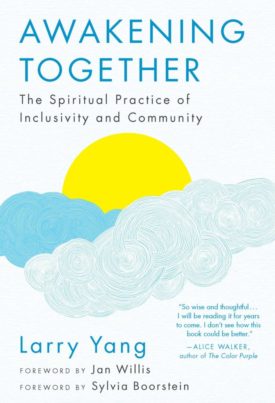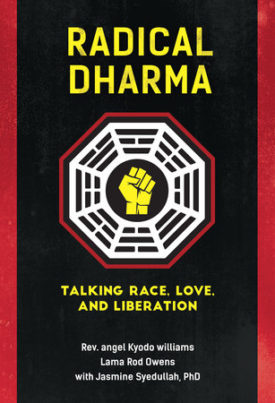Our Member Blog is a place for members to share dharma reflections and original works that support our practice together. To submit something for sharing on the blog, email interbeingkingston@gmail.com.
Message from Robin Mallery
The following message has been shared by our dear sibling Robin Mallery:
Dear Sangha,
We often express to one another our deep sense of gratitude for the presence we have in one another’s lives, for the solace we know in anticipation of and during our shared Sangha experience. I cherish our connection, our loving support of one another and of all living beings — knowing that such compassionate and intentional people share this collective life experience brings me comfort and hope.
My retirement life chapter begins in earnest come January, such that my ability to engage in Sangha practice will likely be limited during our road trips. As someone mentioned last week, when I cannot join you all “in person”, I sit quietly instead with a vision of our zoom squares as a placeholder in my heart. I will continue to do so as we travel, as I have every intention of continuing my practice.
If you would like to follow our adventures, as I write about my commitment to a low-waste lifestyle, plant-based eating on the road, and the best birding/flower hikes, please do so here: https://mallerymiles.com. I will surely sit in with you as I am able when we are home in between trips. In the meantime, please know how much you have come to mean to me, and my deep gratitude for my Sangha family.
Many blessings,
Robin
PS. When we visit Leaf in St. Catherine’s, we will make a pilgrimage to Kingston. It will be then that I will have the honor and pleasure of (finally) hugging you in person. While I am not sure when that will be, I will give plenty of notice so we can arrange for a gathering. xo
Book Club Proposal
Sangha member Leaf Kretz is interested in starting a book club to read one of the following two books (or both, but one at a time!). Both books center the voices of members of oppressed groups, and explore how issues of oppression persist within Buddhist communities and practices, thereby starting necessary conversations for how to work against the operations of oppressive systems.
The two books are:

Awakening Together: The Spiritual Practice of Inclusivity and Community
Larry Yang, Forewords by Jan Willis and Sylvia Boorstein
More information can be found at:
https://www.simonandschuster.ca/books/Awakening-Together/Larry-Yang/9781614293514

Radical Dharma: Talking Race, Love, and Liberation
Rev. angel Kyodo williams, Lama Rod Owens, and Jasmine Syedullah, PhD
More information can be found at:
The book selected (or which one we want to read first if there is interest in reading both), time/date, format, duration, and frequency of the meetings will reflect the interests of the group that forms. If you are interested please reach out to Leaf at lkretz@dal.ca by January 31.
Hope CCKB service talk at KUF – Keith on Dec 3rd, 2017
from Kingston Unitarian Fellowship, Sunday service December 3rd, 2017. Service led by CCKB group, selection from one of the speakers, sangha member Keith Gawronski-McNinch:
HOPE comes in many forms, and can indeed be naive, passive, clinging to irrational belief, and deeply attached to outcomes. HOPE can expect perfection while intertwined with a fear that dreads anything less. And yes, HOPE can even be dangerous, an illusion holding us in harmful situations.
But there is also a type of HOPE which is not attached to the results of our actions; a type of HOPE not clinging to naive belief that everything will turn out well. This kind of HOPE is informed by awareness, and is active, not passive, not being attached to outcomes, not being filled with expectations, but rather, seeing events and circumstances as meaningful on their own, and worthwhile, regardless of how they turn out.
Buddhist teacher Thich Nhat Hanh often says that without the mud, there can be no lotus. He uses mindfulness to transform suffering and painful emotions, heal past trauma, and turn this “mud” into compassion for ourselves and others. He teaches that positive emotions always need to be nurtured and fed to survive; and likewise suffering survives only because we enable and feed it.
Being aware of the painful feelings is an art. Most of us don’t like to be with our pain. We’re afraid of being overwhelmed by it, so we seek to run away. Thich Nhat Hanh teaches that the function of mindfulness is, first and foremost to recognize suffering and take care of it. Like a mother takes a crying baby into her arms without suppressing, judging or ignoring the crying, mindfulness is like that mother, recognizing and embracing suffering, without judgement. The practice is not to fight or suppress our feelings, but rather to cradle them tenderly. And the more you embrace your pain with mindfulness, the more you learn how to handle emotions, and gain insight to face and solve problems.
It is possible to get stuck in the “mud” of life, and find it hard to practice, allowing despair to overwhelm you. Like goats chewing cud, we ruminate on regrets and sorrows, chew on them, swallow them, bring them back up, and eat them again and again, making ourselves victims of the past and future, not living our lives.
The energy of mindfulness can help us. Awareness and insight into things, as they are, not only make hardship less difficult to bear, but help us accept and cope with any outcome. Often when we cling to HOPE for a future we want, our energies and capabilities lose focus on the present moment, including solutions that may be possible. So, it’s not that we shouldn’t have HOPE, but that we not allow it to become an obstacle, blocking us from being present to reality before our eyes, where we may gain insight that may release ourselves and others from past or ongoing suffering.
If we re-channel the energy into being aware of what is going on in the present moment, we open up the possibility for breaking through, discovering joy and peace available right now.
So, when it comes to mindfulness and HOPE, the aim is not to cultivate HOPE, but to cultivate being without expectations, being present to what is, finding solutions when they are needed, but staying present and bouncing back rather than being dragged down by the past or future, to cultivate resilience, and to face the experience of life with both awareness and wonder, and openness to possibilities.
It reminds me of the serenity prayer, some of you may know it “acceptance of the things you cannot change, courage to change the things you can, and the wisdom to know the difference.” HOPE which comes from that mindfulness of the things you can change, and the courage to change them, not clinging to the future, is the kind of HOPE which sees events and circumstances meaningful on their own, and sees ourselves capable of finding joy in the present moment, even in the face of great challenges. Thank you.
Haiku by Stana Luxford Oddie
Tonight at the Interbeing Sangha
Three candles are lit
Rain beats down on the skylight
Humans are flowers